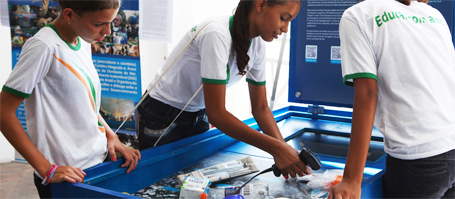Current, socially relevant topics such as garbage in the ocean or overfishing of the world's oceans are brought to the visitor in a playful way. For example, several players can compete against one another as fishermen on the interactive game console EcoOcean and try to fish sustainably and yet profitably. The fish length game, another fishery exhibit, gives visitors a realistic insight into the world of domestic fish species such as herring and cod and their catch sizes. The aim is to raise awareness about good and sustainable fish on the market and to highlight the issue of overfishing. Both exhibits are examples of the interdisciplinary cooperation in the Cluster of Excellence "The Future Ocean".
In addition to playful approaches, the realistic visualization of science plays an important role in the exhibition modules. In addition to original and 1: 1 replicas of marine research instruments, such as drifters, gliders and side-scan sonars, with the Next Generation Interactive Poster visitors can dive in and experience the measurement of the oceans also digitally and by touch. Here the visitors navigate through a century of measurement data by means of a touch surface and discover various measuring instruments and their function and their value for marine research.
The exhibition modules are being used in a variety of presentations, such as during the Science Year Sea and Oceans 2016 * 2017, on the floating exhibition ship MS Science, at the Kiel Week or on the Day of German Unity, and promoting the exchange between science and society in museums and at conferences.
…
